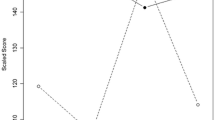Abstract
Student evaluation of course quality was examined as an intervening variable in a path model with seven input variables and the following two output variables: (1) whether students would recommend the course to others, and (2) students' plans to take more courses in the discipline. Student evaluation of the lecturer was the most powerful input variable for the intervening variable course rating. Class format, defined as lecture or lecture with small groups, did not affect course ratingper se but did relate to students' attitudes toward taking more courses in the discipline. Lecturer and textbook evaluation had significant independent effects on whether the student would recommend the course to others. The major implication for university departments is that quality of instruction in introductory courses has impact on future enrollment plans.
Similar content being viewed by others
References
Asher, H. B.Causal modeling. Beverly Hills, Calif: Sage Publications, 1976.
Astin, A. W. et al. The American freshman: national norms for Fall 1979. Los Angeles: Cooperative Institutional Research Program, Laboratory for Research in Higher Education. Graduate School of Education, University of California, 1980.
Baker, P. J. Inquiry into the teaching-learning process: trickery, folklore, or science?Teaching Sociology 1980,3 237–245.
Bolton, B., Bonge, D., and Marr, J. Ratings of instruction, examination performance and subsequent enrollment in psychology courses.Teaching of Psychology 1979,6 82–85.
Centra, J. A. Student ratings of instructors and their relationship to student learning.American Educational Research Journal 1977,14 17–24.
Centra, J. A.Determining faculty effectiveness. San Francisco: Jossey-Bass, 1979.
Costin, F., Greenough, W. T., and Menges, R. J. Student ratings of college teaching: reliability, validity and usefulness.Review of Educational Research 1971,41 511–535.
Doyle, K. O.Student evaluation of instruction. Lexington, Mass.: Lexington Books, 1975.
Doyle, K. O., Jr., and Whitely, S. E. Student ratings as criteria for effective teaching.American Educational Research Journal 1974,11 259–274.
Dubin, R., and Taveggia, T. C.The teaching-learning paradox: a comparative study of college teaching methods. Eugene, Oreg.: Center for the Advanced Study of Educational Administration, University of Oregon, 1968.
Feldman, K. A. Consistency and variability among college students in rating their teachers and courses: a review and analysis.Research in Higher Education 1977,6 233–274.
Frey, P. W. Student ratings of teaching: Validity of several rating factors.Science 1973,182 83–85.
Frey, P. W. A two-dimensional analysis of student ratings of instruction.Research in Higher Education 1978,9 69–91.
Grasha, A. A.Assessing and developing faculty performance: principles and models. Cincinnati, Ohio: Communication and Education Associates, 1977.
Jiobu, R. M., and Pollis, C. A. Student evaluations of courses and instructors.The American Sociologist 1971,6 317–321.
Krathwohl, D., Bloom, B., and Masia, B.Taxonomy of educational objectives, handbook II affective domain. New York: McKay, 1964.
Kulik, J. A., and Kulik, C. C. Student ratings of instruction.Teaching of Psychology 1974,1 51–57.
Marsh, H. W., Fleiner, H., and Thomas, C. S. Validity and usefulness of student evaluations of instructional quality.Journal of Educational Psychology 1975,67 833–839.
Marsh, H. W., and Overall, J. U. Validity of students' evaluations of teaching effectiveness: cognitive and affective criteria.Journal of Educational Psychology 1980,72 468–475.
McGee, R. Does teaching make any difference?: a perplexed essay.Teaching Sociology 1974,1 210–223.
McKeachie, W. J., and Solomon, D. Student ratings of instructors: a validity study.Journal of Educational Research 1958,51 379–383.
McKeachie, W. J.Teaching tips. A guide for the beginning college teacher. Lexington, Mass.: Heath, 1969.
McKeachie, W. J., and Kulik, J. A. Effective college teaching. In F. N. Kerlinger (Ed.),Review of research in education, Vol. 3. Itasca, Ill.: Peacock, 1975.
McKeachie, W. J. Student ratings of faculty: a reprise.Academe 1979,65 384–397.
Naftulin, J. E., Ware, J. E., and Donnelly, F. A. The Dr. Fox lecture: a paradigm of educational seduction.Journal of Medical Education 1973,48 630–635.
Rodin, M., and Rodin, B. Student evaluation of teachers.Science 1972,177 1164–1166.
Taveggia, T. C. Goodbye teacher, goodbye classroom, hello learning: a radical appraisal of teaching-learning linkages at the college level.Journal of Personalized Instruction 1977,2 119–122.
Vaughan, C. A. Identifying course goals: domains and levels of learning.Teaching Sociology 1980,7 265–279.
Author information
Authors and Affiliations
Rights and permissions
About this article
Cite this article
Bruton, B.T., Crull, S.R. Causes and consequences of student evaluation of instruction. Res High Educ 17, 195–206 (1982). https://doi.org/10.1007/BF00976697
Received:
Issue Date:
DOI: https://doi.org/10.1007/BF00976697




